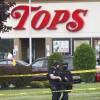How did we get here? To a place where hate speech is so common that people feel free to make loud public proclamations and to seek out platforms to express their hostility. Where the kind of hyper violent racist/sexist/antisemitic rants — once the purview of fringe extremists — is, it seems, routinely embraced. It feels as though the people spewing the hateful attitudes and speech are no longer only reinforcing their own disgusting views but are also attracting others to the fold. It’s alarming to wonder who among ordinary Americans are the newest recruits.
The Rev. Martin Luther King Jr. described hate as an “unchecked cancer.” I am increasingly frightened about how rapidly this cancer has metastasized across the country and in local communities like Quincy. Just a couple of weeks ago, 77-year-old John Sullivan was speeding near the post office earlier this month when George Ngo, one of several nearby pedestrians reportedly asked him to slow down. Instead, police say Sullivan hit Ngo with his car, the impact lifting him on the hood until he was able to scramble off a few hundred yards later. Sullivan then hit him again sending him into a ditch; he ended up in the hospital with a broken shoulder, injured leg and a concussion.
Desiree Thien, the victim’s sister, told Quincy police Sullivan shouted, “Go back to China” and added “I’m going into the post office and will come back out in five minutes. If you’re still here, I’m going to kill all of you.” Sullivan was arrested and held without bail, facing multiple charges including assault and battery, and reckless driving. In 2020, the FBI detailed the highest level of hate crime reporting in 12 years. Nationwide, the sharp rise in attacks targeted members of the LGBTQ and Jewish communities, Asians, Latinos and African Americans — hate-fueled violence the FBI describes as domestic terrorism.
Payton Gendron drove more than three hours from his home motivated by white supremacist beliefs expressed in his online racist commentary. He arrived at Buffalo New York’s Tops Friendly Market, he said, to “kill as many Blacks as possible.” In September, four months after Gendron murdered 10 African Americans in the predominately Black neighborhood, President Joe Biden convened the United We Stand Summit — his first attempt to bring national awareness to the spread of hatred and racism. Three months later, the White House convened another high-level discussion about hate, this time a roundtable about antisemitism headed up by Doug Emhoff, husband of Vice President Kamala Harris.
Second Gentleman Emhoff, who is Jewish, opened the discussion acknowledging “an epidemic of hate facing our country.” The roundtable comes days after former President Donald Trump hosted both rapper Kanye West, who has made anti-Jewish remarks, and Holocaust denier and white supremacist Nick Fuentes. That would be the same former president appropriately credited with ratcheting up the recent wave of racist rhetoric.
The Rev. King often warned about “the silence of good people,” which he called “the ultimate tragedy.” I’ve been disappointed by the silence of some because I know the only way to defeat the dangerous impact of hate is an overwhelming consistent and firm public rejection.
Second Gentleman Emhoff told roundtable participants, “I am not afraid. I refuse to be afraid.” I wish I felt the same.








